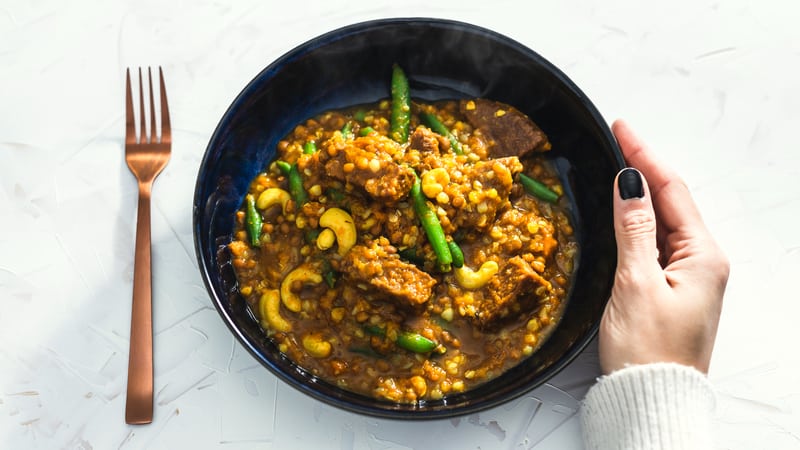Health: 7 of the Best Plant-Based Foods
They're tasty. And delicious. And plant-based.

Plant-based eating is one of the most practical solutions for starting healthier eating habits. Not only is it better for your body, it’s better for the planet too. Here are the seven key foods to keep on your shopping list when you’re trying to eat more plants, according to Natalie Rizzo, M.S., R.D., a New York City-based registered dietitian.
1. Walnuts
Walnuts are the only nuts that that provide a significant amount of the essential plant-based omega-3 fatty acid ALA (2.5 grams per 1-ounce serving), and also contain protein (4 grams) and fiber (2 grams). A systematic review from Harvard also found that a diet supplemented with anywhere from 5 to 24% of calories from walnuts resulted in a significantly greater decrease in total cholesterol. We love walnuts in everything from energy bars and breakfast bowls to soups, salads and pasta.
2. Potatoes
Spuds are anything but the enemy. Both white potatoes and sweet potatoes are packed with potassium, an electrolyte that’s necessary for hydration. And potatoes are a resistant starch, so they actually aid in digestion and reduce your hunger levels. Potatoes are affordable and easy to cook, and they’re great fuel for active people.
3. Soy
It’s no surprise that most people think of tofu when they think of plant-based eating: 3 ounces has a whopping 9 grams of protein. Soy is a complete protein, meaning that it contains all of the essential amino acids that are not commonly found in many plant proteins. But tofu is also a good source of calcium, which is great for anyone avoiding dairy. Tofu can be added to practically any dish, from stir-fries to salads to smoothies.
4. Broccoli
The Dietary Guidelines recommend filling half your plate with fruits and vegetables, and all veggies are important in plant-based diets. A cup of raw broccoli has about 3 grams of protein, 30 calories and 10% of your daily fiber (2.5 grams). It also has potassium, vitamin K, vitamin C and calcium. “I love to roast up broccoli in the oven with a little bit of olive oil and salt, and you can also add raw or steamed broccoli to salads,” says Rizzo.
5. Brussels sprouts
Brussels sprouts are often available year-round, and they keep well in the fridge. Just 1 cup of Brussels sprouts has 100% of the Daily Value of vitamin C, 4 grams of protein and 4 grams of fiber. Research shows that the phytochemicals (plant compounds) found in Brussels sprouts are associated with a reduced risk of cancer.
6. Tempeh
Tempeh is a fermented soybean cake that is packed with plant-based protein. Not only does 3 ounces of tempeh have 16 grams of protein, but the fermentation process used to make tempeh creates good-for-the-gut probiotics. Plus, tempeh has a nice texture that can hold up in sandwiches or veggie burgers.
7. Lentils
You’ll get plenty of satisfying protein (9 grams per 1/2 cup) and fiber (8 grams per 1/2 cup) from lentils, both of which promote a healthy digestive system. They’re full of iron and folate too. You can easily swap lentils for the meat in many recipes, like tacos, burgers and Bolognese sauce. Pair lentils with other plant-based proteins like whole grains and walnuts to form a “complete” protein. One cup cooked lentils has 18 grams of protein.
Real Simple magazine provides smart, realistic solutions to everyday challenges. Online at www.realsimple.com.

